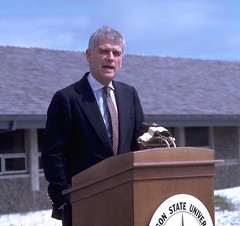 NEWPORT – Oregon Sea Grant’s popular Visitor Center at OSU’s Hatfield Marine Science Center switches to its summer schedule this Memorial Day weekend, open from 10 am to 5 pm seven days a week.
NEWPORT – Oregon Sea Grant’s popular Visitor Center at OSU’s Hatfield Marine Science Center switches to its summer schedule this Memorial Day weekend, open from 10 am to 5 pm seven days a week.
With an ever-changing array of high-tech exhibits based on ocean and coastal science, hands-on activities including a tide-pool touch tank, videos and presentations on topics ranging from marine mammals to coastal hazards, and a central tank featuring a lively giant Pacific octopus whose three-times-a-week feedings are a favorite of visitors, the Center is a great place to spend a few hours on the central Oregon coast.
There’s no admission charge, but visitors are encouraged to make a donation (suggested at $5/person, $20/family) to help support our animals, our exhibits and our programming.
On Saturdays, you can sign up for behind-the-scenes tours of the animal health wing to learn how our aquarists and volunteers care for the fish and invertebrates in our living exhibits. Later in the summer, guided outdoor tours introduce visitors to the natural wonders of the Yaquina Bay Estuary. And frequent special events include marine animal dissections, talks by ocean scientists, and more.
Visitors also have the opportunity to contribute to science: The Center is the nation’s leading laboratory on free-choice learning, the study of how people learn in aquariums, museums and other non-classroom activities. We use our exhibits to measure how people interact, what they enjoy and what they learn.
The center is managed by Oregon Sea Grant, which also uses it as home base for a lively k-12 marine education program that includes summer science camps, high school career days, and age-appropriate science programs for children from pre-school up. And our bookstore is a great source for books, posters, apparel and games with an ocean theme.





